|
|
|
Sort Order |
|
|
|
Items / Page
|
|
|
|
|
|
|
| Srl | Item |
| 1 |
ID:
137551
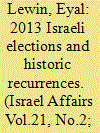

|
|
|
|
|
| Summary/Abstract |
The 2013 election campaign in Israel shows, at first glance, some unanticipated results and unexpected reactions of several political actors. Three events in particular can be noted: (1) the rise of a significant centrist middle-class party; (2) the association of the newly elected right-wing Prime Minister with his left-wing rivals; and (3) the revival of a national religious party after years of decline. A broad overview, however, reveals that from many perspectives numerous key elements of Israeli politics have remained broadly the same over the decades. Some unanticipated outcomes of the elections are to a substantial extent repetitions of past events, referred to in this paper as historic recurrences. In order to establish this claim about historic recurrence, each event is compared to past events with which several striking similarities are found. In order to explain the phenomenon of historic recurrence in Israeli politics, two sets of concepts are applied: the sociological terminology regarding reference group and collective identity, and rational choice theories about voter behaviour and the preferences of political actors.
|
|
|
|
|
|
|
|
|
|
|
|
|
|
|
|
| 2 |
ID:
126036
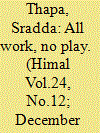

|
|
|
|
|
| Publication |
2011.
|
| Summary/Abstract |
On a random Wednesday in June this year, my 13-year-old cousin was not in school. This was not due to one of the many bandhs or another addition to one of the all-too-many public holidays celebrated in Nepal. Instead, every 10th grader in her school had passed the all-important School Leaving Certificate examinations - 'Half with distinction', she added. This is certainly quite an achievement - apparently, enough of one to give every student, 10th grader or not, the day off. Indeed, declaring a holiday for simplistic reasons has become a frequent occurrence in Nepal, to the extent that days 'off' sometimes feel more like the norm than days 'on'. Yet before we raise our eyebrows at the school administration for the example they are setting for schoolchildren, we need to consider a few additional issues.
|
|
|
|
|
|
|
|
|
|
|
|
|
|
|
|
| 3 |
ID:
126920
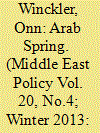

|
|
|
| 4 |
ID:
125075
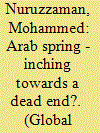

|
|
|
|
|
| Publication |
2013.
|
| Summary/Abstract |
A high degree of pessimism continues to hold a strong grip over the enthusiasts of democracy in the Arab world. In the last more than two years, the popular uprisings for social and political change have stalled in Bahrain, Syria, and Yemen. In Egypt, Libya, and Tunisia, where the populace succeeded in toppling the authoritarian rulers, the situation did not change that much. Violence, conflicts, and killings of political opponents disturbingly characterize all the Arab countries affected by the popular uprisings. In Syria, the government and opposition forces are locked in a deadly conflict with neither side being able to make a decisive breakthrough. The Egyptian army overthrew the country's first democratically elected government, headed by the Muslim Brotherhood, on 3 July 2013. On the whole, the success rate of democratization is so far disappointing. That begs the question whether the Arab popular uprisings for democratic change, what the media has conveniently dubbed the 'Arab Spring', are failing or still enduring.
|
|
|
|
|
|
|
|
|
|
|
|
|
|
|
|
| 5 |
ID:
074068
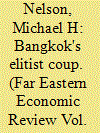

|
|
|
| 6 |
ID:
126676
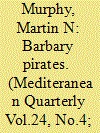

|
|
|
|
|
| Publication |
2013.
|
| Summary/Abstract |
This essay describes the piracy that took place in the Mediterranean from the time of ancient Greece to Barbary. It explains the corso, the sea war between nonstate but state-endorsed Christian and Muslim parties, with reference to the Knights of Malta and, more extensively, the Barbary corsairs. Although the essay focuses primarily on history, it also draws some conclusions about piracy and the international system today. The essay notes a prevailing assumption that contemporary piracy off Somalia and that perpetrated by the Barbary pirates is similar, but it further notes that any similarities are slight and superficial. At the same time, similarities rooted in economic, social, and political change do exist between all outbreaks of depredation at sea and the responses to them.
|
|
|
|
|
|
|
|
|
|
|
|
|
|
|
|
| 7 |
ID:
126047
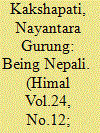

|
|
|
|
|
| Publication |
2011.
|
| Summary/Abstract |
Tharu. Chhetri. Danuwar. Gurung. Lohar. Newar. The Nepali people belong to 102 ethnicities, castes and other groups and speak 92 living languages. Amidst sweeping political changes, it has become very important to define oneself along ethnic lines, to show where loyalties lie.
|
|
|
|
|
|
|
|
|
|
|
|
|
|
|
|
| 8 |
ID:
148267
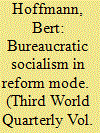

|
|
|
|
|
| Summary/Abstract |
Standard wisdom explains Cuba’s current transformation as one of economic change but political immobility. However, Cuban politics have also undergone a major change since the handing over of power from Fidel to Raúl Castro – even if the rhetoric used has been one of continuity. This article traces this process by looking at four areas: the depersonalisation and re-institutionalisation of the political structures; the diversification of the public sphere, particularly through the use of digital media; the liberalisation of travel and migration, with its transformative impact on state–citizen relations; and the turn to a moderate foreign policy, as highlighted by the rapprochement with the USA, with its implications for legitimising the underpinnings of Cuban socialism. Although the shift has been well below the threshold of a transition to multiparty democracy, Cuba has evolved from the charismatic model of the past to what can be understood as bureaucratic socialism in reform mode.
|
|
|
|
|
|
|
|
|
|
|
|
|
|
|
|
| 9 |
ID:
130188
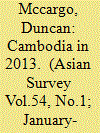

|
|
|
|
|
| Publication |
2014.
|
| Summary/Abstract |
Cambodia in 2013 was dominated by close-fought national elections on July 28, only narrowly won by the ruling Cambodian People's Party after an unexpectedly strong showing by the opposition. Generational change was a major theme of the year, seen in the growing activism of youth and the deaths of several prominent figures.
|
|
|
|
|
|
|
|
|
|
|
|
|
|
|
|
| 10 |
ID:
130607
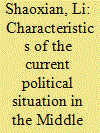

|
|
|
|
|
| Publication |
2014.
|
| Summary/Abstract |
By comparison with the "Arab Spring" that swept through the whole Bregion in 2011 and the political transition evident in many Arab countries in 2012, political development in the Middle East in 2013, to many observers, seemed lost in chaos. Arab countries undergoing political change were plagued by disorder, volatility, and violence. With US. strategic withdrawal from the region imminent, geopolitical dynamics
regrouped. Struggles among regional powers entered a new stage. Four characteristics of the Middle East situation are harbingers for future outcomes: political "ehaos" in the Arab world, "flux and reflux" between moderate and radical lslamists, geopolitical shocks caused by the strategic withdrawal of the U.S. from the region, and continued uncertainty over the Iranian nuclear issue.
|
|
|
|
|
|
|
|
|
|
|
|
|
|
|
|
| 11 |
ID:
129202
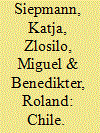

|
|
|
|
|
| Publication |
2014.
|
| Summary/Abstract |
The Chilean Presidential and Parliamentary elections of the first-round general election on November 17th and the second round run-off for the presidency between remaining candidates Michelle Bachelet and Evelyn Matthei on December 15th, 2013 were decided by problems, not by ideology, and by past rather than future issues. These issues, partly hidden from the international public, are likely to remain over the next years. Thus comprehending them is crucial to understand the transition of the country.
|
|
|
|
|
|
|
|
|
|
|
|
|
|
|
|
| 12 |
ID:
078929
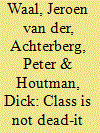

|
|
|
|
|
| Publication |
2007.
|
| Summary/Abstract |
By means of a reanalysis of the most relevant data source-the International Social Mobility and Politics File-this article criticizes the newly grown consensus in political sociology that class voting has declined since World War II. An increase in crosscutting cultural voting, rooted in educational differences rather than a decline in class voting, proves responsible for the decline of traditional class-party alignments. Moreover, income differences have not become less but more consequential for voting behavior during this period. It is concluded that the new consensus has been built on quicksand. Class is not dead-it has been buried alive under the increasing weight of cultural voting, systematically misinterpreted as a decline in class voting because of the widespread application of the so-called Alford index
|
|
|
|
|
|
|
|
|
|
|
|
|
|
|
|
| 13 |
ID:
162609
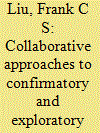

|
|
|
| 14 |
ID:
124478
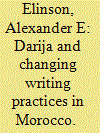

|
|
|
|
|
| Publication |
2013.
|
| Summary/Abstract |
Social, political, and technological changes have forced changes in the contemporary Moroccan linguistic landscape. In print media, advertising, music, fictional writing, and translation, Moroccan Arabic (d?rija) is being written in a variety of ways that point to a shift in perceptions and usage of d?rija in daily Moroccan life. In this article, I provide a discussion of recent developments in the use of d?rija in writing, and discuss how this evolving situation is articulated by intellectuals, journalists, publishers, fiction writers, and translators.
|
|
|
|
|
|
|
|
|
|
|
|
|
|
|
|
| 15 |
ID:
109649
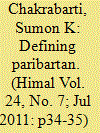

|
|
|
| 16 |
ID:
129087
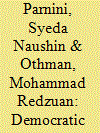

|
|
|
|
|
| Publication |
2014.
|
| Summary/Abstract |
In recent years efforts have been made to improve governance by ensuring institutional performance and policing for greater transparency to sustain liberal democracy in Bangladesh and elsewhere. Since gaining independence in 1971, The People's Republic of Bangladesh has been driven by internal power struggles and economic chaos, while attempting to develop a democratic society. A predominately Islamic country, Bangladesh's representative government is battling poverty and rampant corruption. Although this study appreciates what Bangladesh has achieved so far, it seeks to deviate from the general trend that romanticizes Bangladesh's democracy and its recent connection with new governance parameters. This study attempts to identify some of the major paradoxes that Bangladesh's democracy is faced with. All these factors will be analyzed in the context of a contemporary notion of governance and democracy in Bangladesh.
|
|
|
|
|
|
|
|
|
|
|
|
|
|
|
|
| 17 |
ID:
107865
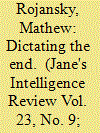

|
|
|
| 18 |
ID:
129243
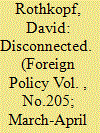

|
|
|
|
|
| Publication |
2014.
|
| Summary/Abstract |
The fabric of civilization is being rewoven around us. The very nature of life, work, and society is changing so profoundly that we are approaching a moment at which our old ways of thinking about the structures that sustain us may be seen as obsolete. This happens periodically throughout history -- think of the Renaissance, the Reformation, the Enlightenment, and the Industrial Revolution. Such eras often produce turmoil or upheaval, until leaders emerge who are able to help shape a new order for a new age.
The question today is whether our leaders are up to the challenge. Given their lack of grounding in the world's most pressing scientific and technological issues, I fear many, if not most, are not. Formerly disenfranchised populations are increasingly connecting to telecom, Internet, and other services. For instance, mobile-phone penetration was estimated to have surpassed 80 percent in Africa in the first quarter of 2013, according to figures published in 2012 by ABI Research. What's more, it is growing faster in Africa than anywhere else in the world. And though smartphone penetration in Africa is just 20 percent -- pretty near global levels -- it is expected to explode in the next few years.
|
|
|
|
|
|
|
|
|
|
|
|
|
|
|
|
| 19 |
ID:
067325
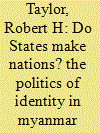

|
|
|
| 20 |
ID:
126320
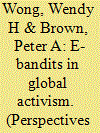

|
|
|
|
|
| Publication |
2013.
|
| Summary/Abstract |
In recent years, WikiLeaks and Anonymous have made headlines distributing confidential information, defacing websites, and generating protest around political issues. Although many have dismissed these actors as terrorists, criminals, and troublemakers, we argue that such actors are emblematic of a new kind of political actor: extraordinary bandits (e-bandits) that engage in the politics of no one via anonymizing Internet technologies. Building on Hobsbawm's idea of the social bandit, we show how these actors fundamentally change the terms of global activism. First, as political actors, e-bandits are akin to Robin Hood, resisting the powers that be who threaten the desire to keep the Internet free, not through lobbying legislators, but by "taking" what has been deemed off limits. Second, e-banditry forces us to think about how technology changes "ordinary" transnational activism. Iconic images of street protests and massive marches often underlie the way we as scholars think about social movements and citizen action; they are ordinary ways we expect non-state actors to behave when they demand political change. E-bandits force us to understand political protest as virtual missives and actions, activity that leaves no physical traces but that has real-world consequences, as when home phone numbers and addresses of public officials are released. Finally, e-banditry is relatively open in terms of who participates, which contributes to the growing sense that activism has outgrown organizations as the way by which individuals connect. We illustrate our theory with the actions of two e-bandits, Anonymous and WikiLeaks.
|
|
|
|
|
|
|
|
|
|
|
|
|
|
|
|
|
|
|
|
|